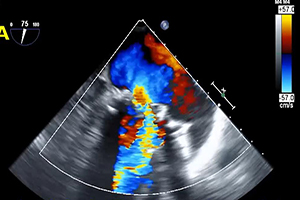Access options for transcatheter mitral valve implantation in patients with prior surgical bioprosthesis
Abstract
Background: Transcatheter mitral valve-in-valve (TMVIV) procedure, either transapical (TA) or trans-septal (TS) has become a valuable alternative to conventional redo surgery in case of failing mitral bioprosthesis with good clinical outcomes. Here we present our fourteen-year institutional experience.
Methods: All consecutive patients treated with TMVIV with either TA or TS access at our centre between July 2007 and July 2020 were included. Periprocedural and 30-day follow-up (FU) results are reported and TA and TS data are compared.
Results: Eighty-two patients were included, of those 60 (73.2%) were TA while 22 (26.8%) were TS. Men represented 51.2% of the population with a mean age of 77.3±9.0 years. STS score and EuroSCORE II were 11.4%±6.2% and 11.5%±6.5% respectively. Baseline characteristics of TA and TS groups were comparable. TMVIV was performed at a median time of 9.3 years [interquartile range (IQR), 7.9–12.0 days]
from the initial mitral valve surgery. Balloon expandable transcatheter heart valve (THV) prostheses (Edwards LifeSciences Corp., Irvine, CA, USA) were used exclusively. Technical success was 97.6% (96.7% and 100.0% for TA and TS respectively) with two (2.4%) periprocedural death, both in the TA group (P=0.533). We observed four (4.9%) left ventricular outflow tract (LVOT) obstructions with one being hemodynamically significant. Six (7.3%) major bleeding occurred in the TA group, not significantly different from TS group (P=0.279). The median length of stay was 6 days (IQR, 4–12 days, 1.5 vs. 7.0 days for TS and TA groups respectively, P=0.001). The overall 30-day mortality rate was 3.7%. We also observed three (3.7%) structural valve deteriorations and in one (1.2%) case the patient required redo mitral surgery at two months. Eighty-seven-point-eight percent of patients were I–II New York Heart Association (NYHA) class. At 30-day FU mean transmitral valve gradient was 7.3±2.7 mmHg and one patient (1.2%) had mitral regurgitation greater than mild. TA and TS groups were comparable.
Conclusions: Our 14-year single-center experience with TMVIV confirms procedural safety and is an effective alternative to redo surgery with comparable results with both TA and TS. With device, technical improvements and increasing operators’ experience, TS is the preferred option for TMVIV. However, in some highly selected patient, TA may still play an important role.
Cover






